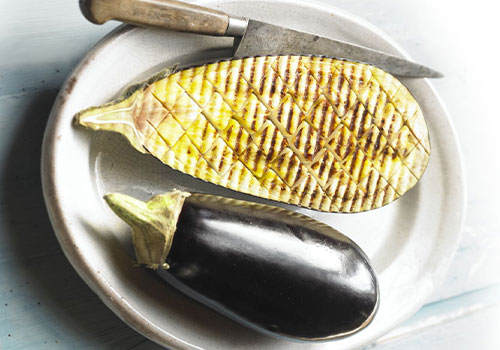The health benefits of… aubergines

Full of vitamins, minerals and dietary fibre and with the potential to lower cholesterol and help manage weight, aubergines are a great choice for salads, stews and beyond. Our nutritionist shares the health benefits, ongoing research and history behind this versatile ingredient…
Along with tomatoes, potatoes and bell peppers, the aubergine (solanum melongena) belongs to the nightshade plant family (Solanaceae). In fact, aubergines grow in a manner much like tomatoes, hanging from the vines of a plant that grows several feet in height. They have a deep purple, glossy skin encasing cream coloured, sponge-like flesh dotted with small, edible seeds. In addition to the classic purple variety, aubergines are available in other colours including lavender, jade green, orange and yellow and in a range of shapes and sizes. The most popular variety of aubergine looks like a large, pear-shaped egg, hence the American name ‘eggplant.’
The modern aubergine owes its origin to the wild version that is native to South East Asia. Prior to the middle ages it was introduced in Africa before spreading throughout Europe and the Middle East. For centuries aubergines were enjoyed more as a decorative garden plant than as a food due to its bitter taste.
Nutritional highlights
Aubergines are an excellent source of dietary fibre. They are also a good source of vitamins B1 and B6 and potassium. In addition it is high in the minerals copper, magnesium and manganese.
| 25kcal | 1g protein | 0.2g fat | 6g carbohydrate | 3.4g fibre |
|---|
Aubergines are rich in antioxidants, specifically nasunin found in aubergine skin – which gives it its purple colour. A potent antioxidant and free radical scavenger, nasunin has been found to protect the lipids (fats) in brain cell membranes. Cell membranes are almost entirely composed of lipids and are responsible for protecting the cell and helping it to function. The lipid layer is crucial for letting nutrients in, wastes out and receiving instructions from messenger molecules that tell the cell what to do.
 Research
Research
Research on aubergines has focused on nasunin. It is not only a potent antioxidant, protecting the fatty acids essential for healthy brain function, but it also helps move excess iron out of the body. Although iron is an essential nutrient, necessary for transporting oxygen in the blood, immune support and collagen synthesis, too much iron is not recommended.
Aubergines are high in fibre and low in fat and therefore recommended for those managing type 2 diabetes or managing weight concerns. Initial studies indicate that phenolic-enriched extracts of eggplant may help in controlling glucose absorption, beneficial for managing type 2 diabetes and reducing associated high blood pressure (hypertension).
Aubergines may also help to lower LDL (bad) cholesterol levels. These positive effects are likely to be down to nasunin and other phytochemicals in aubergines.
How to select & store
On visual inspection, the skin colour should be vivid, shiny and free of discoloration, scars and bruises, which usually indicate that the flesh beneath has become damaged and possibly decayed. The stem and cap at the top of the aubergine should also be free of discolouration. Choose auberinges that are firm and heavy for their size. To test the ripeness of an aubergine, gently press the skin with the pad of your thumb. If it springs back, the aubergine is ripe, if an indentation remains, it is not.
Aubergines are actually quite perishable, being sensitive to both heat and cold. Store them whole in a plastic bag and store in the refrigerator, where they will keep for a few days. If you cut an aubergine before you store it, it will decay quickly. Once cooked, aubergines can be stored in the fridge for up to three days.
It is often recommended to tenderise aubergines and to reduce the bitter taste by salting it. After cutting the aubergine into the desired shape, sprinkle it with salt and allow it to rest for about 30 minutes. This process pulls out some of the aubergine’s water content and along with it some of the bitter components. If you are trying to reduce your salt intake, you can simply wash the salt off.
 Safety
Safety
Aubergines are a member of the nightshade family (Solanaceae), which includes bell peppers, tomatoes and potatoes. Research suggests a link between aggravated arthritic symptoms and the consumption of these types of foods. Although no case-controlled studies confirm these findings, some individuals consuming nightshade-family vegetables experience an aggravation of arthritic symptoms and may benefit from limiting or avoiding these foods.
Aubergines contain significant amounts of oxalate. Individuals with a history of oxalate-containing kidney stones should avoid overconsuming them.
[“source-ndtv”]




